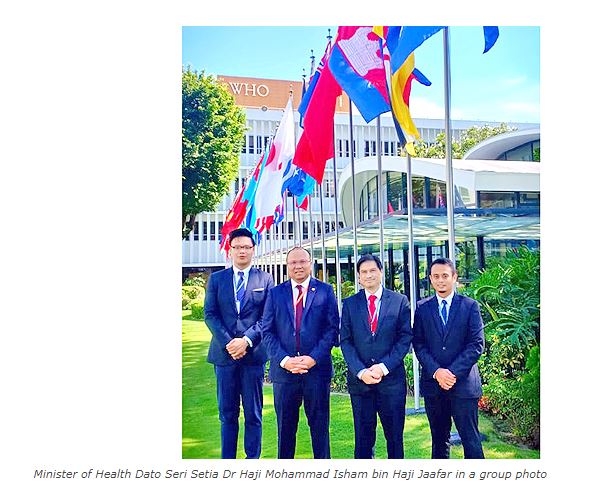Brunei shares concern over obesity rise, tobacco consumption
Brunei Darussalam shared concerns over the rise of obesity, particularly among children, despite increased awareness of healthy eating among the population and health awareness programmes on a healthy diet at the ongoing 70th Session of the World Health Organization (WHO) Regional Committee for the Western Pacific in Manila, Philippines.
Brunei Darussalam called for concerted action to take into account how media companies and online technology industries can operate responsibly and in the public interest, given their capacity to shape public opinion on food consumption.
The issue of protecting children from the harmful impact of food marketing was discussed at the annual Regional Committee Meeting, attended by Minister of Health Dato Seri Setia Dr Haji Mohammad Isham bin Haji Jaafar, together with health ministers and representatives from 37 countries and areas within the Western Pacific Region.
Other topics discussed at the meeting included action to fight antimicrobial resistance, tobacco control and promoting well-being into older age. In addition, the Regional Committee will discuss progress in a number of regional programmes, including health security, non-communicable diseases and mental health, and climate change.
On tobacco control, Brunei Darussalam identified the illicit trade of tobacco products and the marketing of products such as e-cigarettes, vapes and heated tobacco products as major areas of concern. In addressing the issue, the Ministry of Health (MoH) is working with the Ministry of Finance and Economy (MoFE), Ministry of Foreign Affairs (MFA), and law enforcement agencies towards the ratification of the Protocol to Eliminate the Illicit Trade in Tobacco Products.
In addition, the MoH has strengthened the accessibility and quality of smoking cessation services across the health sector, and aims to strengthen enforcement of the existing tobacco control legislation.
At the panel discussion on ageing and health, Brunei Darussalam stated its approaches in response to changing demographics with increasing older population. In meeting the healthcare needs of the elderly population, a shift in approach from hospital-based to delivering care closer to home has been identified, to which a community-based day care centre – Pusat Amal Cerah Sihat, for older individuals, their families and carers – has been established in partnership with the private sector and civil society.
Brunei Darussalam stated that it values aging as an asset, and will continue to work towards supporting the elderly to live independently with age-friendly healthcare systems in place.
Among the agenda of the meeting was a discussion on the white paper For the Future: Towards the Healthiest and Safest Region – a policy paper developed to respond to current and future health challenges in the Region, and to articulate the vision for WHO’s work with member states and partners in the coming five years. In response to this discussion, it was noted that the priorities for the Western Pacific Region outlined in this White Paper align closely with that of Brunei Darussalam, as reflected in the new MoH Strategic Plan 2019-2023 which prioritises five key goals: excellence in healthcare services, non-communicable diseases prevention and control, protection of public health through effective policies and regulations, sustainability through resource optimisation and innovation, and transparent and proactive governance.
This is the 70th year the Regional Committee has convened, and it is the first meeting under the leadership of the new Regional Director Dr Takeshi Kasai.
Dato Seri Setia Dr Haji Mohammad Isham, who was elected as the Vice-Chair for this year’s session of the Regional Committee from October 7-11, is accompanied by Deputy Permanent Secretary (Professional) at the MoH Dr Haji Zulaidi bin Haji Abdul Latif and senior officials from the MoH.
Source: https://borneobulletin.com.bn/brunei-shares-concern-obesity-rise-tobacco-consumption-2/


 Thailand
Thailand




